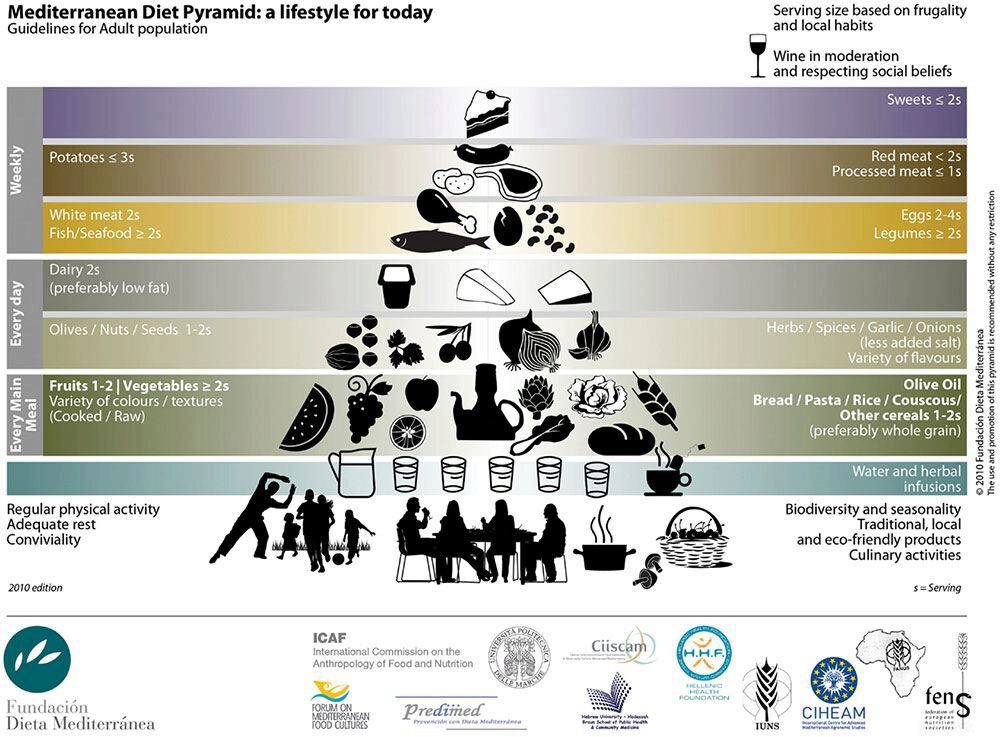The Mighty Mediterranean
Why the mediterranean diet is the gold standard for health!
Let Gymaholic show you how can you bring the mediterranean style to your table, and reap the numerous benefits of this highly praised diet!
You may or may not have heard about it. This diet originated in, surprise, the mediterranean. More specifically though, the basin countries surrounding the mediterranean sea, like France, Greece, Spain and Italy.
It all started with a study called the Seven Countries Study done in the 1950’s. It investigated various countries, noting that strangely, death by coronary heart disease was significantly lower in southern Europe compared to northern Europe and other countries around the world, especially the western world.
The French Paradox is a scientific problem that has plagued scientists for a decades. It was spawned when other scientists were picking apart the seven countries study, noting that France had a particularly low occurrence of cardiovascular disease and death.
These countries still continue to be among the healthiest countries in the world, with less incidence of those diseases, and a longer life span in general.
The benefits of the mediterranean diet have expanded to not only include reduced risk of coronary heart disease, cardiovascular disease and all cause mortality (death), but also:
- Cancer (Mainly breast and colon)
- Adult-Onset Diabetes
- Fatty Liver Disease
- Insulin Sensitivity
- Metabolic Syndrome
- Cognition (Brain function)
- Depression & Anxiety
- Stroke
They have only just scratched the surface for the numerous benefits, and it’s clear that to achieve this number of benefits there has to be multiple causes. It turns out that there is even more to this ‘diet’, than food. The mediterranean lifestyle also plays a part in the health benefits of this diet...
Starting with the diet itself, there are no strict parameters yet, but the general rules are based on a specific food pyramid. This diet overall resembles a non-restrictive vegetarian diet.
Weekly servings:
- Less than 2 servings of sweets
- Less than 3 servings of potatoes
- Less than 2 servings of red meat and processed meat
- Around 2 servings of white meat and 2-4 servings of eggs
- More than 2 servings of fish
- More than 2 servings of legumes
Daily servings:
- About 2 servings of dairy (specifically low fat yogurt and cheeses)
- 1-2 Servings of olives, nuts and seeds
- Lots of herbs, spices, garlic, onions to add flavor with less added salt.
Every meal:
- 1-2 servings of fruits
- More than 2 servings of vegetables.
- Regular or extra virgin olive oil, in place of other fats like butter.
- 1-2 servings of bread, rice, pasta, couscous, and other cereals. *Preferably whole wheat!
Water, tea and moderate, social alcohol consumption (especially wine!) is also very important. Although the diet is a large part of why you get the primary health benefits, combining the diet with the cultural behaviours and social aspects of these countries also promotes those benefits, and is actually considered **part of the diet: **
- Regular physical activity
- Adequate rest
- Friendliness
- Diverse and seasonal foods
- Traditional, local and eco-friendly products
- Eating, drinking and cooking socially with friends/family
To measure how well someone is sticking to this diet, scientists created the Mediterranean Dietary Score (MDS). It is a point system based on how well you follow the rules above. Each list item is worth 0 or 1 point, the higher your point score out of 9, the more closely you are following the mediterranean diet.
- Greater consumption (listed above) of vegetables (1) , legumes and beans (1), fruits, nuts and seeds (1), whole grains (1) and fish (1) each grant a point.
- A heavier ratio of monounsaturated (beneficial fats) to saturated (non-beneficial) fats - usually through greater consumption of (extra virgin) olive oil - grants 1 point.
Lesser consumption (listed above) of meats (1) and most high-fat dairy (1) grants 1 point, at or above the recommended servings is 0 points.
For alcohol, men who consume 10-50g per day and women who consume 5-20g per day get 1 point.
The bulk of the protective effects of the mediterranean diet are obviously coming from the dietary habits of these countries and their cultures, but there is not enough evidence to pinpoint the exact food sources.
Generally though, the components of the diet are thought to be very healthy and their benefits make a lot of sense. Low consumption of red meats and sweets cuts out high sugar foods and cancer-causing carcinogens from heavy meat consumption, replacing them with healthier fats found in fish and plant sources. Plant oils, nuts and seeds have high omega-3s, which have numerous benefits of their own. In addition to that, high fruit and vegetable consumption provides fibre and antioxidants which fight cancer and increase lifespan.
Let’s quickly recap all this new information about the mediterranean diet.
- Countries around the mediterranean sea had less instances of coronary heart disease, cardiovascular disease and death.
- There are many more benefits from consuming this diet that have been discovered over time.
- The diet is high in fruits, vegetables, nuts, seeds and whole grains, has moderate amounts of dairy (low fat yogurt and cheese), poultry and fish and is low in red meats and simple sugars.
- You can measure how well you’re following the diet you can use the Mediterranean Dietary Score.
- This diet reduces simple sugar and meat carcinogen intake, increases healthy fat (omega-3!) consumption and provides plenty of fibre and antioxidants, leading to many of the listed health benefits.
Health promoting and delicious!
- De Lorgeril, Michel, et al. "Mediterranean diet and the French paradox."Cardiovascular research 54.3 (2002): 503-515.
- Trichopoulou, Antonia, et al. "Definitions and potential health benefits of the Mediterranean diet: views from experts around the world." BMC medicine12.1 (2014): 1.
- Estruch, Ramón, et al. "Primary prevention of cardiovascular disease with a Mediterranean diet." New England Journal of Medicine 368.14 (2013): 1279-1290.
- Bach-Faig, A., et al. "Mediterranean Diet Foundation Expert Group: Mediterranean diet pyramid today." Public Health Nutr 14 (2011): 2274-2284.

